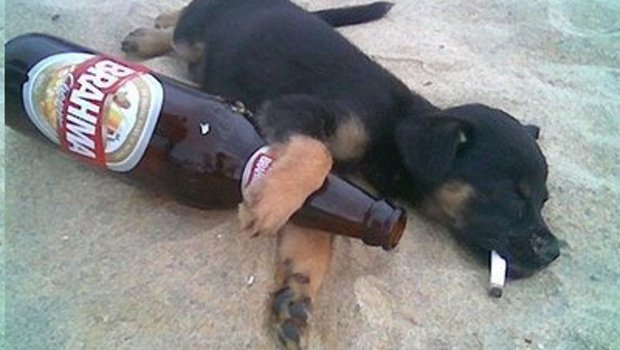
Guest contributor: Johannes Lichtman
The Anatomy of a Hangover
categories: Cocktail Hour
5 comments
 by special guest star Johannes Lichtman
by special guest star Johannes Lichtman
“The reason why so many professional artists drink a lot is not necessarily very much to do with the artistic temperament, etc. It is simply because they can afford to, because they can normally take a large part of the day off to deal with the ravages.” –Kingsley Amis
The greatest hangover scene in literature? The Guardian claims it’s from Kingsley Amis’ Lucky Jim:
His mouth had been used as a latrine by some small creature of the night, and then as its mausoleum. During the night, too, he’d somehow been on a cross-country run and then been expertly beaten up by secret police. He felt bad.
A good hangover scene, no doubt. But Cormac McCarthy’s Suttree gives Amis a run for his money:
He woke with the undersides of his eyelids inflamed by the high sun’s hammering…His clothes cracked with a thin dry sound and shreds of baked vomit fell from him…He tried to swallow but his throat constricted in agony…staggering under the heat, his stomach curdling. He wandered into a narrow alley and fell to his hand and knees and began to vomit. Nothing would come but a thin green bile and then nothing at all, his stomach contracting in dry and vicious spasms that racked him and left him sweaty and shivering and weak when they ceased.

 Maybe it’s unfair to compare, since Amis’ hangover depiction is very funny (much like the first part of a hangover enjoyed with friends) while McCarthy’s hangover scene is long and parched (the poor guy can’t find a drink of water) and physically painful to experience (much like a long hangover suffered alone).
Maybe it’s unfair to compare, since Amis’ hangover depiction is very funny (much like the first part of a hangover enjoyed with friends) while McCarthy’s hangover scene is long and parched (the poor guy can’t find a drink of water) and physically painful to experience (much like a long hangover suffered alone).
Kingsley Amis was a bit of a hangover connoisseur. Amis drank so much that he convinced a British newspaper to give him a weekly drinking column to justify his binges as “work.” (Speaking of which, have I mentioned the column I’m working on about sitting at bus stops and ogling women?) In his essay “The Hangover,” collected in Everyday Drinking, Amis suggested that Kafka’s “Metamorphosis” is the best literary depiction of the hangover: “The central image could hardly be better chosen, and there is a telling touch in the nasty way everybody goes on the chap.”
Along with his praise of Kafka’s (perhaps unintentional) depiction of the hangover, Amis provides a list of ways to combat an awful hangover. His first suggestion is to engage in vigorous sexual activity—unless you wake up in bed with somebody you shouldn’t be in bed with: “Guilt and shame are prominent constituents of the metaphysical hangover, and will certainly be sharpened by indulgence on such an occasion.” Amis adds, “For the same generic reason, do not take the matter into your own hands if you awake by yourself.” (Disagree, Mr. Amis. Disagree.) Amis also suggests reading the final scene in Paradise Lost. Having tried it, I can attest that this is the worst fucking hangover cure of all time.
Amis has some good advice in Everyday Drinking, mainly on how to skimp on booze costs without looking cheap (for hosting cocktail parties, he suggests filling a glass with tonic, then pouring the gin over an upside-down-turned spoon so the booze settles in a film on the surface, giving the illusion of a strong drink), but his hangover cures leave something to be desired.
I’ve been thinking about hangovers lately mainly because of a lifestyle change I’m trying to implement. For the past nine years or so, I’ve consumed a fair amount of alcohol. No legendary binges, no drinking that would shock people who spend a lot of time around serious drinkers, but probably more than is healthy. As part of my “stop being a cliché” New Year’s resolution, I’ve resolved to cut down. The most immediate result is that I’ve been waking up in the morning feeling fresher than usual. This is going to sound painfully obvious, but, over the past few years, I had assumed that I didn’t get hungover anymore. I could have eight, ten, twelve drinks without feeling much of anything the next day. Of course, what I’ve recently realized is that I didn’t stop getting hungover—I was simply hungover so often that I stopped realizing what it felt like not to be hungover. I’ve been remembering lately. Which makes my now occasional hangovers much more acute.
On the much rarer occasions when I now wake up hungover, I notice:
- Hangovers are funny for a while when you’re around other hungover people, reminiscing about the stupid things you did the night before, and not so funny alone.
- This is what people meant over the past nine years when they said “I can’t go out tonight, I’m hungover.”
- Generally, when writer types write pieces called “The Anatomy of [X]” there’s close to a 0% chance that the actual anatomy of X will be discussed at all, since we tend to know nothing about science (and tend to be too lazy to learn anything about science). Most of these pieces could probably more accurately be titled “A Few Pretty General Paragraphs About [X] Before I Start Talking About My Life, Which Is VERY Interesting.”
Anyway. Did you like the pictures of the hungover dogs? Aren’t they just adorable? I included them as part of my effort to gradually transition the blog from book talk to cute pictures of animals and funny slideshows. To that end, here’s a slideshow of crime writers wearing leather jackets.
Johannes Lichtman blogs about books and bling at blingtheory.net That’s where this essay originally appeared. I am sorry that my drawing of him makes him appear overly worried.

Here at Magipatch (http://magipatch.com) we have created a patch that delivers the organic vitamins needed to endure the hangover and in most cases let the celebration go longer with enhanced alcohol consumption while using our hangover remedy patch.
We would love to send a sample to the site’s moderator to give it a try and let us know your thoughts.
Hi Johannes! I’ve been to your blog and like it a lot! I’ve made lists of your lists, as a matter of fact, and definitely, need more time in the day…So, love the leather jackets–my own (although I don’t write detective mysteries) is a black leather trench, upturned collar, tall black boots with crazy heels, lots of dark eyeliner (call it my Euro Trash Spy Outfit). Notice parenthesis and caps. Caketrain IS gorgeous! And MORE caps! Sigh.
Thanks for posting at Bill and Daves, I’ll continue to visit your site, it’s terrific!
How kind of you, Debora. And glad to see that you’re getting on board with the all-caps words; Houellebecq likes to italicize every tenth word, but all-caps is the literary technique of the TRUE avant garde. Thanks for reading.
That’s a great one, Bill. I’ll have to go check it out again–haven’t read Lowry in a while, but I’ve heard multiple sources say that he was the greatest (worst) drinker of the whole bunch. If we’re getting into nonfiction, some of the scenes from Tom Dardis’ THE THIRSTY MUSE: ALCOHOL AND THE AMERICAN WRITER can probably compete with any fiction in terms of amount of alcohol consumed.
Thanks, Johannes. These days I feel more hungover when i don’t drink. I vote for the opening of chapter two of Malcolm Lowry’s Under the Volcano, in which our hero is found at the bar of the Bella Vista Hotel drinking whiskey at 7:00 a.m., and missing his socks, but only because he’s too alcoholic to put them on.